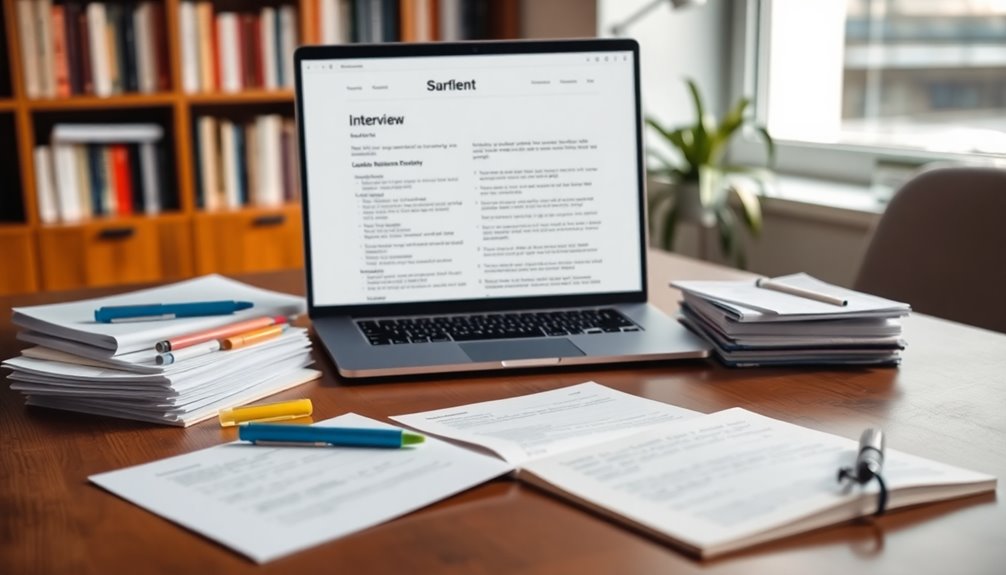Mastering the art of interview reports is essential for making informed hiring decisions. Start by gathering key points and quotes from each interview. Aim for clarity and consistency, ensuring your reports simplify discussions and keep evaluations uniform. Use structured templates to organize your insights effectively, and always document your impressions promptly after the interview. Maintain professionalism throughout, avoiding personal biases. By focusing on these practices, you'll streamline your hiring process and enhance collaboration among team members. If you're enthusiastic to improve your reporting skills even further, there's more valuable information waiting for you.
Key Takeaways
- Begin with a structured template to ensure consistency and clarity in capturing candidate evaluations.
- Document key observations immediately post-interview to enhance accuracy and detail in reports.
- Balance objective facts with subjective impressions to provide a comprehensive view of candidates.
- Tailor the report's tone and style to the intended audience for effective communication.
- Incorporate feedback from team members to continuously improve the quality of interview reports.
Understanding Interview Summary Reports

Understanding interview summary reports is essential for anyone involved in the hiring process, since they provide a structured and coherent account of candidate evaluations. These reports capture the essence of professional conversations, summarizing interviewers' observations and experiences.
By documenting key points and insights, you facilitate better communication among team members and enhance the decision-making process.
You'll find that an effective summary report combines objective facts with subjective impressions, creating a well-rounded assessment of each candidate. This documentation not only aids in evaluating candidates but also serves as a valuable reference for future interviews.
Ultimately, mastering this skill will streamline your hiring process, ensuring you make informed choices that align with your organization's goals.
Significance of Summary Reports

Summary reports play an essential role in streamlining the hiring process and enhancing communication among team members. By summarizing key insights from interviews, these reports guarantee everyone's on the same page, making decision-making smoother and more efficient.
Here are some notable benefits of summary reports:
- Clarity: They condense complex discussions into digestible information.
- Consistency: They maintain a uniform approach to evaluating candidates.
- Reference: They create a valuable resource for future hiring discussions.
- Collaboration: They foster better teamwork by sharing perspectives and insights.
Incorporating summary reports into your hiring process can considerably boost your team's efficiency and effectiveness, helping you make informed decisions confidently.
Crafting Your Summary Report

Crafting an effective interview summary report is essential for capturing the essence of your discussions and insights. Start by gathering all relevant information, including key points and quotes from the interview.
Tailor your tone and style to fit the audience and purpose of the report; whether you choose a Q&A or narrative format, consistency is key. Focus on documenting both objective facts and subjective impressions to provide a well-rounded assessment.
Be certain to draft your report promptly after the interview to guarantee accuracy and clarity. Finally, keep your writing professional, avoiding personal opinions or biases, which can cloud your evaluation and impact decision-making. Additionally, consider the emotional impact of the interviewee's experiences, as this can provide deeper insights into their responses.
A clear, concise summary will serve as a valuable reference for future discussions and decisions.
Utilizing Report Templates

Using report templates can greatly streamline the process of creating interview summary reports. They provide a structured format that helps you stay organized and focused.
Here's how you can effectively utilize report templates:
- Choose the Right Template: Select a template that fits your interview style—whether it's Q&A or narrative.
- Customize as Needed: Modify sections to suit specific requirements or organizational preferences.
- Fill in Details Promptly: Complete the template soon after the interview to guarantee accuracy and detail retention.
- Maintain Professional Tone: Use a professional tone throughout the report, avoiding personal opinions.
Effective Interview Writing Practices

Three key practices can elevate your interview writing and secure clarity and professionalism.
First, use shorthand during the interview for quick note-taking. This helps you capture essential points without losing focus on the conversation.
Second, consider recording the interview, but always obtain consent first. This allows for accurate transcription and guarantees you don't miss any important details.
Finally, draft your report soon after the interview. Your memory will be fresher, leading to a more accurate representation of the discussion.
Additionally, incorporating feedback from user feedback can help refine your interview reports over time.
By following these practices, you'll enhance your writing's effectiveness and maintain a professional tone, making your reports valuable resources for decision-making.
Frequently Asked Questions
What Are Common Mistakes to Avoid in Interview Summary Reports?
When writing interview summary reports, avoid common mistakes like being too vague or overly detailed.
Don't forget to include key points and quotes that reflect the interviewee's insights. Keep your tone professional, steering clear of personal biases.
Make sure you complete the report soon after the interview to maintain accuracy.
Finally, remember to tailor your content to your audience, as this enhances clarity and effectiveness in communication.
How Can I Improve My Interview Questioning Techniques?
They say, "Practice makes perfect."
To improve your interview questioning techniques, start by preparing open-ended questions that encourage discussion. Actively listen to responses, and don't hesitate to ask follow-up questions for clarity. When you create a comfortable environment, interviewees are more likely to open up.
Additionally, review your past interviews to identify which questions worked well and which didn't. Keep refining your technique, and you'll see significant improvement over time.
What Tools Can Assist in Writing Interview Summary Reports?
To assist you in writing interview summary reports, consider using tools like templates for structure and organization.
Software such as Google Docs or Microsoft Word can help format your reports neatly. Recording apps can capture interviews for accurate transcription, and note-taking tools like Evernote enhance your shorthand capabilities.
Additionally, project management tools can keep track of your reports and deadlines, ensuring you stay organized and efficient throughout the process.
How Do I Handle Conflicting Information From Interviewees?
When you encounter conflicting information from interviewees, it's essential to remain objective.
Start by verifying facts against additional sources or documents. If possible, follow up with the interviewees for clarification, asking open-ended questions to gather more context.
Document all perspectives carefully in your report, noting discrepancies. This approach not only maintains professionalism but also aids in informed decision-making, ensuring you consider all viewpoints before drawing conclusions.
What Should I Do if I Miss Key Points During an Interview?
It's easy to feel overwhelmed when you miss key points during an interview, but don't panic.
First, review your notes immediately after the interview to capture your thoughts. If possible, reach out to the interviewee for clarification on specific topics.
Consider recording future interviews (with consent) to guarantee accuracy.
Finally, always ask follow-up questions during the interview to dig deeper and cover any gaps while maintaining the conversation flow.
Conclusion
In mastering interview reports, you'll find that each conversation holds a treasure trove of insights waiting to be uncovered. As you apply these techniques, you'll not only elevate your writing but also enhance decision-making in your organization. Coincidentally, the more you practice, the more natural this process will feel, transforming interviews into powerful tools for growth. So, embrace this journey, and watch your skills flourish—what starts as a simple report can turn into a catalyst for change.
Eugene brings a fresh, dynamic voice to our platform as one of our talented Writers. Specializing in research-driven content, he explores the latest findings in psychology and personal growth, translating them into actionable insights for our readers. Eugene’s work is fueled by a curiosity about what makes us tick and a desire to help others unlock their potential.










